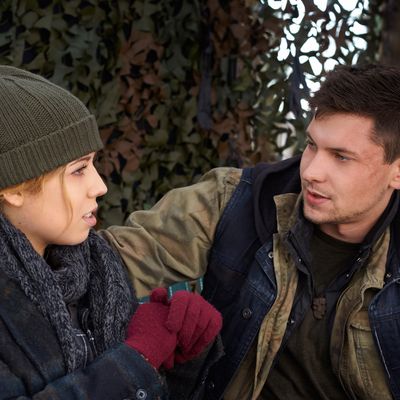
I always wonder why more episodes of survivalist reality series Doomsday Preppers arenÔÇÖt about free, widespread first-aid and health-care education. Stockpile your canned goods all you want, but you better hope someone around knows how to pop a dislocated shoulder back in, triage a head injury, or keep a wound clean. Growing a garden takes some real devotion, and as some of us were taught in nursery school, many hands make light work. When the end-times start, are we really going to run around shooting each other? Or if we had enough food and shelter and kindness, wouldnÔÇÖt there be enough to go around, and wouldnÔÇÖt we not feel the need to shoot each other? IÔÇÖd like to have a gentle apocalypse, please.
But the end-times stories, the pandemics and plagues and isolation stories TV has right now, are not about a resigned return to the simple earth. TheyÔÇÖre about how monstrous and violent and despicable we are, and how tenuously we maintain civil society. The Walking Dead has a pretty grim assessment of humanity, and how quickly weÔÇÖll turn on those closet to us, how easily weÔÇÖll become hardened, and how systematic weÔÇÖll be about cannibalism. The Last Man on Earth has no struggle with scarcity at all ÔÇö there are plenty of resources for the survivors ÔÇö yet the show consists of a group of people who fundamentally loathe some members, and who maintain worthless gender politics. The 100 depicts profound tribalism and several massacres, as if future societies were completely unfamiliar with the idea of two heads being better than one. (LetÔÇÖs make the planet stop being poison together!) We know that throughout human history, even amid the starkest of suffering, people created art and sought comfort and found ways to ritualize joy. But youÔÇÖd never know it from our doomsday TV shows, which are far more inclined to show us improvised weapons than an improvised instrument.
NetflixÔÇÖs new series Between, a joint project between the streaming service and Canadian broadcaster City, has a similar outlook: EveryoneÔÇÖs a big stinky jerk, and when the Badness starts, everyone gets worse. IÔÇÖm not saying the human race isnÔÇÖt full of true garbage humans, but does every story have to be about them? CanÔÇÖt one favorite high-school math teacher also survive, and remind everyone about the value of hard work? BetweenÔÇÖs spin on the genre is that its plague ÔÇö┬áor whatever it is ÔÇö only affects people over the age of 21. So far, itÔÇÖs only killing off old people in one small town (ÔÇ£Pretty Lake,ÔÇØ oy), which brings on the quarantine. And as with Under the Dome, things go haywire pretty fast. Netflix only made the first episode available for review, but just in the pilot, thereÔÇÖs gunfire and violence. Are we really this prone to chaos? Even in Canada?
The dialogue on Between is horrendous, and the performances are not much better. ÔÇ£You and your conspiracy theories!ÔÇØ chides a mom. ÔÇ£You remind me of your father!ÔÇØ In case you didnÔÇÖt catch how ominous that was, her mouth immediately fills with blood ÔÇö I think itÔÇÖs blood, at least ÔÇö┬áand she collapses to the floor, dead. How do you like them conspiracy theories, mom? Our heroine is Wiley (iCarly and Sam & CatÔÇÖs Jennette McCurdy), a surly teen mom and the daughter of a local preacher. You can tell how badass she is because she sasses a stained-window depiction of Jesus. Man, watch out, Juno, thereÔÇÖs a new pregnant teenager with ÔÇÿtude. Adam (Jesse Carere) has an uncle who works in some kind of public-health lab, and Adam openly admits to monitoring his emails and phone calls. Gord (Ryan Allen) wants to join the Army. But before he can, all these older people start dying, and suddenly their town of 8,000 has lost 2,000 residents. This should feel propulsive, but the pilot barely lurches along. Netflix is releasing one episode a week, in a traditional broadcast model, which seems especially ill-suited to a show with so little momentum.
Science fiction is one way we have of depicting and metabolizing current cultural fears. The Twilight Zone isnÔÇÖt about martians, itÔÇÖs about the second Red Scare; Battlestar Galactica isnÔÇÖt about space, itÔÇÖs about the War on Terror and the normalization of torture in American warfare. Dawn of the Dead isnÔÇÖt just zombie horror, itÔÇÖs a critique of consumerism. Castaway or isolation fiction ÔÇö Lord of the Flies, Lost┬áÔÇö is most interesting when that alien environment reveals something about the true nature of its current inhabitants, a true nature their ordinary society perhaps discourages. So itÔÇÖs extra frustrating that our current crop of dystopian shows seems so incapable of positing any big ideas, of even raising big questions.
BetweenÔÇÖs not obligated to be political, certainly, and maybe if the show were more interesting and energetic, this wouldnÔÇÖt seem so galling. (ThatÔÇÖs why I mostly give a pass to The 100: ItÔÇÖs lively enough to get away without some grand thesis.) But we ÔÇö big We, everybody We ÔÇö┬ácould really use some shows that help critique and recontextualize whatever its creators perceive as contemporary widespread fears. IÔÇÖm not so much afraid of doomsday as I am of doomsday preppers whose models rely on bunkers and scarcity rather than communal survival. And of course my biggest fear ÔÇö of having to watch even more shows that have nothing to say.

